Quests: Last Shaman of Sarawak
Posted on 13. Jul, 2024 by Paul Sochaczewski in Articles
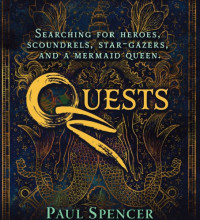
THE ALMOST LAST SHAMAN It’s been a good ride, but Borneo healer doesn’t expect many others to follow his path. SERUBAH ULU, Sarawak, Malaysia To the untrained eye he seems an unlikely magician. Frail, but with a hundred-watt smile. He has two wispy whiskers, short grey hair, and he walks a bit slowly. […]
Read MoreSearching for Orwell
Posted on 13. Jun, 2024 by Paul Sochaczewski in Articles, Curious Travel
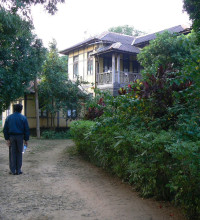
There are worse travel strategies than to visit places with evocative names.
There’s Timbuktu, Congo, and Okavango in Africa; and Salvador de Bahia, Darien, and Patagonia in Latin America, names which purr with history and poetry.
But Asia’s resonant place names beckon to me above all others. There’s Sumatra, Java, and Borneo; Malacca, Vientiane, and Makassar; Kelantan, Kathmandu, and Ayudhya. Not to mention the rivers: Ganges and Yangtze, Mahakam and Mekong. And the one I was headed towards: Ayeyarwady.
My destination was Katha, a small town on the Ayeyarwady (Irrawaddy) River, which has achieved a modicum of recognition. It was here, between 1926 and 1927, that a British policeman named Eric Blair spent six months as one of 90 British police officers in Burma. Eric Blair, who subsequently took the pen name George Orwell, based his 1934 novel Burmese Days on a fictionalized version of Katha that he dubbed Kyauktada (which is derived from the name of a district in Rangoon).
Read MoreUncle Joe and Aunt Anisoara
Posted on 21. Apr, 2024 by Paul Sochaczewski in Articles
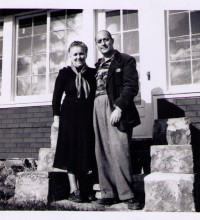
My uncle and aunt’s love affair illustrates the challenges of trying to decipher a relationship.
How could I not love an uncle who, when he babysat me, let me stay up well past my bedtime to watch wrestling (Antonino Rocca was my favorite) and horror movies (Boris Karloff’s The Mummy was the scariest)? How could I not love an uncle who lived in the middle of Greenwich Village, who took me to my first Broadway show, who tried to disprove Einstein? How could I not love an uncle who invented a slew of often-useless gadgets, and who chastised major corporations for their lousy ad campaigns — and then offered them new campaigns that were hardly better? How could I not love an uncle who married a wannabe Romanian noble and bought a farm in the middle of the Adirondack mountains because it resembled his wife’s native Transylvania?
Uncle Joe Rubin died of colon cancer in 1960 when I was 13. I was at an age when I was particularly incurious about life’s complexities and more than a little spooked by having a close family member wither away in our spare room.
Read MoreQuests
Posted on 21. Apr, 2024 by Paul Sochaczewski in Articles

Consider the great cultural and religious myths — the Mahabharata, Beowulf, the Epic of Gilgamesh, Faust, the Divine Comedy, King Arthur and His Knights of the Round Table, the Odyssey, the Ring cycle — which feature a hero (I’m using the term to encompass men and women) who undertakes a journey to uncover a mystery, right a wrong, seek fame or fortune or happiness.
Now think of the classic films — Star Wars, The Wizard of Oz, Die Hard, Casablanca, Gone With the Wind — which explore similar “searching-for” dynamics.
Philosopher Joseph Campbell called these archetypal scenarios the Hero’s Journey. And I suggest they are as important to you and me as they are to Luke Skywalker or Dorothy from Kansas.
Read MoreThe Real First White Rajah of Borneo
Posted on 28. Mar, 2024 by Paul Sochaczewski in Articles, Sultan and the Mermaid Queen
I belong to a small group of people curious about the life and times of Alexander Hare. When we get together, we ponder an improbable question: How did an ambitious 19th-century slave-owner, harem-builder, and political arriviste become the First White Rajah of Borneo?
The bigger question: How does one become king or queen numero uno? More specifically, how might I become the first Supreme Leader With Wisdom Like Solomon Whose Eyes Spot Prey Like an Eagle and Whose Courage Rivals That of a Tiger of my own country?
Read MoreBorneo Tree Spirits Go to Court
Posted on 03. Mar, 2024 by Paul Sochaczewski in Articles, Environment
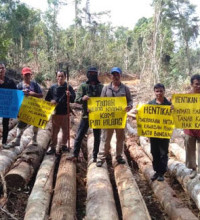
KUALA LUMPUR, Malaysia
“Your honor, I call our ethno-witnesses.” At a signal from Andrew Ajang Mering twelve men and women stood, hesitatingly.
The chief justice, a bemused ethnic-Indian Malaysian named Samuel Aithihyamala, stared over his half-glasses at the plaintiff’s lawyer, Andrew Ajang Mering, then at the large group of men and women who had just risen. “Just how many witnesses do you have, Mister Mering?”
“One for each of the large old-growth trees in the Penan homeland,” Andrew Mering answered. “We’re not sure of the precise number, but probably in the region of six thousand.”
“You’re planning to call approximately six thousand witnesses?”
“No, your honor. That might challenge the patience of the court. I’ll keep the number down to a dozen.”
Read MoreTo Cut That Tree, Cut Through Me
Posted on 16. Feb, 2024 by Paul Sochaczewski in Articles, Environment
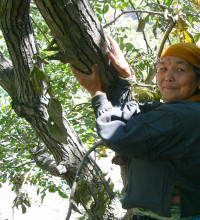
Any new-age nature-lover can hug a tree, and many do. But it takes a special kind of person to embrace a tree that is about to be chopped down and to dare the woodsman: “If you want to cut the tree, you’ll have to cut through me.”
The Chipko movement in north India was founded on this kind of challenge.
I met Srimati Bali Devi Rana, a leader of this unstructured movement, at her 210-person village of Reiny, about an hour north of the Indian hill station of Joshimath, in the north Indian state of Uttarakhand.
Sitting on the roof of her two story-house, with hay drying at our feet and tall peaks just a few kilometers away, she welcomed me with glasses of cold, clear water, tea and homemade nibbles made of corn flakes, peanuts, and masala. Srimati, an animated woman wearing an orange woolen head scarf and homespun jacket and shirt, ran me through the historical origins of the movement.
Read MoreThe Great Plastic Straw Diversion
Posted on 14. Feb, 2024 by Paul Sochaczewski in Articles, Environment
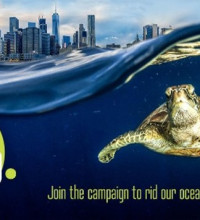
Starting in 2018, in the Unted States, anti-plastic campaigners encouraged people to make their voices heard to stop companies from using disposable plastic straws. One estimate was that as many as 8.34 billion plastic straws pollute the world’s beaches. That sounds like an enormous amount, but of the eight million tons of plastic that flows into the ocean each year, plastic straws comprise just 0.025 percent, a drop in the ocean, as it were.
The eco-sipping campaign was wildly successful. The city of Seattle banned plastic straws. Starbucks, McDonald’s, and dozens of other companies phased out plastic straws and stirrers.
What can we learn from these plastic-related initiatives?
Read MoreEnhancing the Narrative
Posted on 29. Dec, 2023 by Paul Sochaczewski in Alfred Russel Wallace and his assistant Ali, Articles
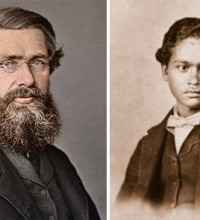
A historian quickly learns there is little absolute truth. The authors of personal memoirs and observer narratives enhance, misremember (sometimes deliberately), censor, and leave out chunks of information.
Rarely, though, do historians try to go beyond the facts and speculate on the emotions, intentions, and psychological motivations of their research subjects.
As a fun exercise, I’ve created several “imagined conversations” between Alfred Russel Wallace and his assistant Ali, based on tidbits of information and provocative clues found in Wallace’s narratives.
Read MoreLaos White Elephant Settles in After Long March
Posted on 30. Nov, 2023 by Paul Sochaczewski in Curious Travel
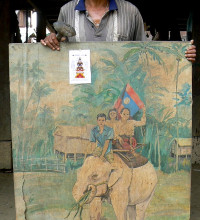
BAN SAMING, Laos
Capturing a rare white elephant usually brings luck and fame, and it did for Boun Somsy, at least for a while.
Then, as sometimes happens, a couple of wannabe-royals stepped in and rained on his parade.
This is a tale of prophetic (and sensual) dreams, an unexpected windfall, how an areligious communist government usurped a potent Buddhist religious symbol, and, as is so often the case, nature conservation.
Read MoreWhat’s His Name?
Posted on 29. Sep, 2023 by Paul Sochaczewski in Alfred Russel Wallace and his assistant Ali
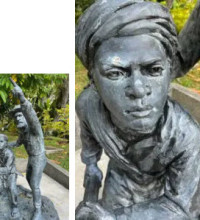
Why should we care about an illiterate 19th-century teenager from Borneo named Ali? More to the point, why should we spend time trying to learn his full name?
A lad simply named Ali, spent six years travelling with Alfred Russel Wallace throughout Southeast Asia.
The primary source for information about Ali comes from Wallace, who mentions Ali 42 times in his classic book The Malay Archipelago and again in his autobiography My Life. In addition, there are three elements of (convincing) second-hand evidence that add context to Ali’s life, but none of them mention Ali’s family name. Spenser St. John, a close friend of James Brooke, the first White Rajah of Borneo, employed a competent young cook named Ali, and it appears that Ali left St. John’s service to work with Wallace. Brothers Frederick and Arthur Boyle, young English adventurers who explored Sarawak, hired Ali as guide and camp manager. They called him Ali Kasut, Ali of the Shoes, in recognition of the black leather shoes he always wore. And in 1907, Thomas Barbour, a respected American naturalist, met a “wizened od Malay man” on Ternate island who called himself Ali Wallace. The idea that Ali described himself as son-of-Wallace is poignant, but doesn’t help with genealogical research.
Read MoreGo For the Goals
Posted on 11. Aug, 2022 by Paul Sochaczewski in Articles, Personal essays
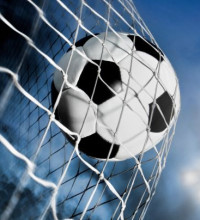
GENEVA, Switzerland
While watching my team lose (again), and half-heartedly wishing for divine intervention, I recalled a statement by Luis Suarez of Uruguay, who proudly declared that his blatant handball, with which he deflected a certain last-second Ghana goal in the 2010 World Cup, exceeded Diego Maradona’s famous ‘Hand of God’ goal which helped eliminate England from the 1986 World Cup in Mexico. “The ‘Hand of God’ now belongs to me,” Suarez said, 10 years after the event. “Mine is the real ‘Hand Of God.’ I made the best save of the tournament.”
Perhaps to prove there is cosmic justice, Uruguay lost their next game, in the semi-finals, to the Netherlands.
But, I don’t believe there is karma in sports.
However, I do believe that football, or soccer as it is called in the United States, is in need of an overhaul.
My suggestions cover two themes — increase scoring, and improve on-field behavior.
Read MoreThe Toughest Sport?
Posted on 14. Jul, 2023 by Paul Sochaczewski in Articles, Personal essays
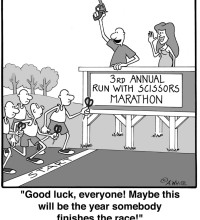
The debate rages, finally, an answer.
Is an Ironman triathlete tougher than an ultramarathoner? Is American football wimpy compared to rugby? What takes more courage and agility, a free solo up El Capitan or a dive off a cliff into a tidal pool?
If your pub conversation slows down you might ask these questions: What is the most dangerous, toughest, hardest-to-master sport? And, by extension, who are the “best” athletes?
At the end of this article I offer my conclusions.
Read MoreWhat I learned by writing an “enhanced biography” of a little-known 19th-century teenager from Borneo
Posted on 07. Jul, 2023 by Paul Sochaczewski in Alfred Russel Wallace and his assistant Ali
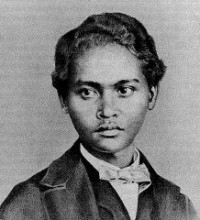
“Look Here, Sir, What a Curious Bird” What I learned by writing an “enhanced biography” of a little-known 19th-century teenager from Borneo Consider the lives of great men and women who explored the curious corners of the world, who made momentous discoveries in science and technology, who created important works of art. We can safely […]
Read MoreWhy Do We Collect?
Posted on 12. Dec, 2021 by Paul Sochaczewski in Ganesha and Collecting
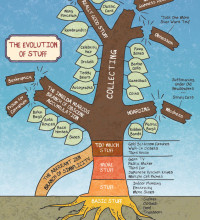
Barbie dolls. Porcelain chickens. Medieval armor. Stamps. Toothpaste tubes. Fossils. Butterflies.
What is behind this widespread need to collect? Does quantity matter? What do the psychoanalysts say – harmless pastime or dangerous obsession?
I was a semi-nerdy kid growing up in northern New Jersey. Like many youngsters, I suppose, I collected stuff – baseball cards, rocks, and North American arrowheads. (As an adult I run across many men of my Baby Boom generation who collected these artefacts. Were there really so many arrowheads floating around in 1950’s suburbia?)
Read More